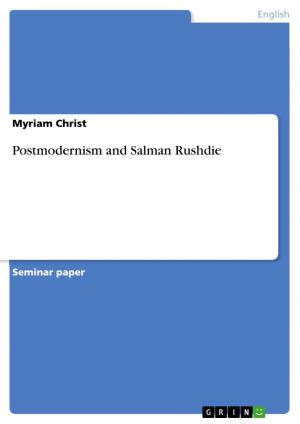The importance and influence of anglicisms in german language and audio-visual advertising
Nonfiction, Entertainment, Drama, Anthologies| Author: | Claudia Stehr | ISBN: | 9783638783613 |
| Publisher: | GRIN Publishing | Publication: | May 13, 2007 |
| Imprint: | GRIN Publishing | Language: | English |
| Author: | Claudia Stehr |
| ISBN: | 9783638783613 |
| Publisher: | GRIN Publishing |
| Publication: | May 13, 2007 |
| Imprint: | GRIN Publishing |
| Language: | English |
Seminar paper from the year 2002 in the subject English Language and Literature Studies - Linguistics, grade: 1,3, Technical University of Braunschweig (Englisches Seminar), course: Language in Advertisment, 9 entries in the bibliography, language: English, abstract: Language is not stable, it is a communication system used by human beings. As people and the environment they live in change and develop, it is natural for language to change and to get influenced, as well. The amount of English words in the German language increased highly since 1945 and especially since advertising plays an important role in our society. After the second World War the connection between Germany and the Western world got stronger and more intensive than it had been before. Especially the areas media, literature, music and theatre, but also politics, sports and economy have very high influences on the growing use of English words in German language. The German Academy of Language in Berlin says that no more than five per cent lexical amount of anglicisms are existing in the German language. That, indeed, is not much, but this does not propose anything about how often these words are used in the every-day language. There are no concrete guidelines or laws about the usage of Anglicisms, and advertising agencies tend to plead that they only orientate on those English words which are already used by Germans. This has to be doubted thinking that the words mail express logistics finance, Stimulating Facial Freshener, or Concentrated Line Smoother are not always understood directly nor by many Germans. But the understanding of Anglicisms will not be the subject of this paper. In my research paper I want to point out which influence the English language has on the language of advertising and how anglicisms are seen in our society. I refer to the audio-visual media (TV-advertisement) and try to conclude about the importance and influence of Anglicisms in general. In this paper the term Anglicism stands for English and American borrowings, as well. To supply evidence for my thesis I give and analyse a few examples of advertising spots from the German channel ARD, and I also present my results of a questionnaire about 'Anglicisms in the German language' which was filled in by 60 Germans. At the beginning I want to go into the terms 'anglicism', 'language of advertising' and I point out the most important reasons for the usage of Anglicisms, to give the reader a clear view in which way these terms have to be looked at and dealt with in this paper.
Seminar paper from the year 2002 in the subject English Language and Literature Studies - Linguistics, grade: 1,3, Technical University of Braunschweig (Englisches Seminar), course: Language in Advertisment, 9 entries in the bibliography, language: English, abstract: Language is not stable, it is a communication system used by human beings. As people and the environment they live in change and develop, it is natural for language to change and to get influenced, as well. The amount of English words in the German language increased highly since 1945 and especially since advertising plays an important role in our society. After the second World War the connection between Germany and the Western world got stronger and more intensive than it had been before. Especially the areas media, literature, music and theatre, but also politics, sports and economy have very high influences on the growing use of English words in German language. The German Academy of Language in Berlin says that no more than five per cent lexical amount of anglicisms are existing in the German language. That, indeed, is not much, but this does not propose anything about how often these words are used in the every-day language. There are no concrete guidelines or laws about the usage of Anglicisms, and advertising agencies tend to plead that they only orientate on those English words which are already used by Germans. This has to be doubted thinking that the words mail express logistics finance, Stimulating Facial Freshener, or Concentrated Line Smoother are not always understood directly nor by many Germans. But the understanding of Anglicisms will not be the subject of this paper. In my research paper I want to point out which influence the English language has on the language of advertising and how anglicisms are seen in our society. I refer to the audio-visual media (TV-advertisement) and try to conclude about the importance and influence of Anglicisms in general. In this paper the term Anglicism stands for English and American borrowings, as well. To supply evidence for my thesis I give and analyse a few examples of advertising spots from the German channel ARD, and I also present my results of a questionnaire about 'Anglicisms in the German language' which was filled in by 60 Germans. At the beginning I want to go into the terms 'anglicism', 'language of advertising' and I point out the most important reasons for the usage of Anglicisms, to give the reader a clear view in which way these terms have to be looked at and dealt with in this paper.















